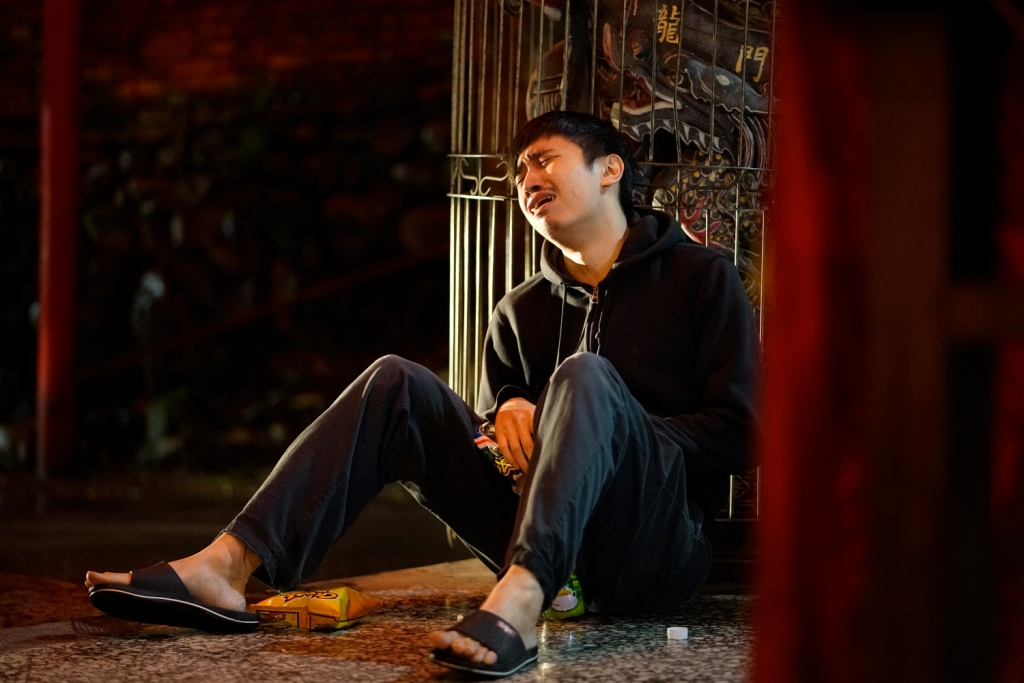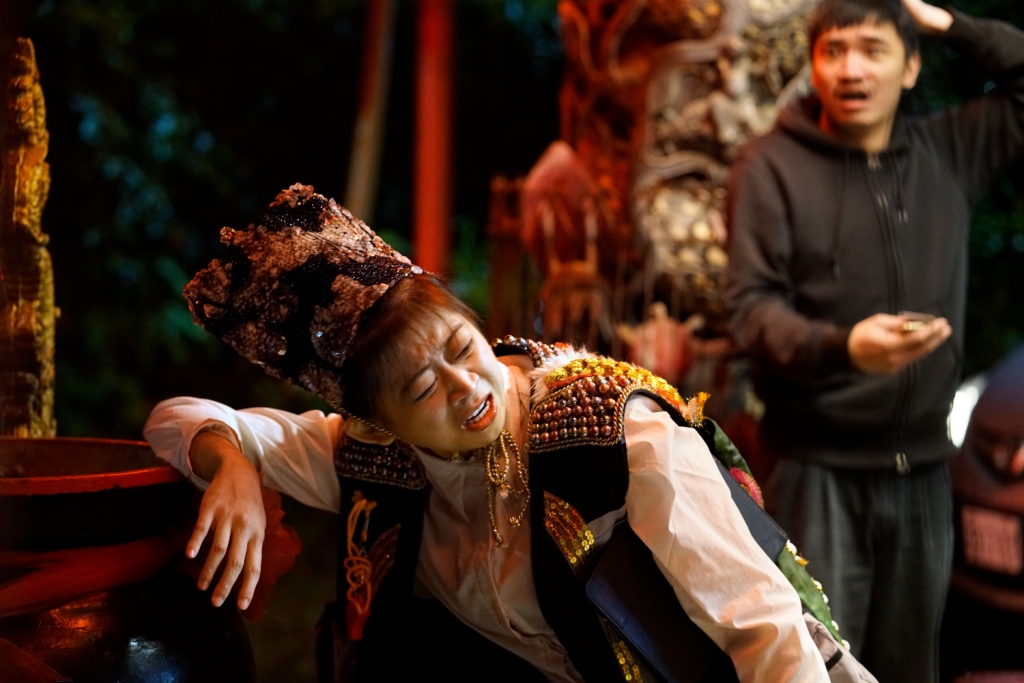《還陽記》敘述一位名叫大亨的年輕人,在廟宇中忿忿不平地抱怨著近年來在工作、生活及愛情上碰到的困境,要求神明協助他脫離這樣的生活。突然出現另一人自稱是黑白無常,告訴大亨他已經往生了。大亨想起自己是在擦拭大樓外牆時,因為安全扣損壞而從高樓墜落。黑白無常於是提出「還陽計劃」,極力說服大亨再購買30年陽壽。最後,甚至出現神明的聲音(神明的聲音是Siri),大亨無奈的困境能解決嗎?還是現實中的無奈,仍舊存在呢?
此作為「空間計畫—流動的饗宴」戲劇類首作,為切合以非典型劇場空間及社會議題為出發之全新原創文本。創作靈感來自聊齋誌異〈考城隍〉,將科舉為社會階級流動的情況,轉化為現代資本主義下,貧困世代難以翻轉階級的現況。
Return to Life tells the tale of a young man named “Boss” who went to a temple with complaints about obstacles he has encountered in work, life, and love in recent years, asking the gods to take him away from this sort of life. In that moment a man claiming to be Mortal Constable Black/White appears, and reminds Boss that he is in fact deceased. Boss begins to recall how he had plummeted to his death due to a malfunctioning safety strap while cleaning the exterior windows of a high rise building. Mortal Constable Black/White proposes a plan for Boss to “return to life,” giving him the hard-sell to buy another 30 years of life, culminating in a guest appearance by the voice of God (which happens to be Siri). Can Boss find a resolution to his hapless dilemma? Or remain resigned to realities of hopelessness?
This work is the opening work in the dramatic genre of Spatial Project: A Moveable Feast, and represents a new original text with a prevailing social issue as a starting point and specifically tailored to a non-traditional theater space. Inspired by the tale “Examination for the Post of Guardian Angel” from the Chinese classic Strange Stories from a Chinese Studio, where the conditions of social mobility as dictated by the Imperial Examination system have been replaced by current class structures that make it difficult to break through the cycle of generational poverty.
詹慧君 / 創作概念 Holly CHAN
國立臺北藝術大學戲劇學系碩士班畢業。現為楊景翔演劇團行政總監暨常駐戲劇顧問、自由文字工作者。近期經歷:2018年楊景翔演劇團《地球自衛隊》製作人、2017年「空間計畫─流動的饗宴」策展人、楊景翔演劇團&思劇場聯合主辦「2017類型戲劇讀劇節」策展人、她的實驗室空間集創團作《奠》製作人、楊景翔演劇團《前進吧!方舟》製作人、說話的狗表演平台劇團《愛,開玩笑》製作人等。
Holly CHAN (Hui-Chun) received her master’s degree from the NTUA School of Theatre Arts. She is a freelance writer and currently serves as executive director and resident dramaturge at Yang's Ensemble, Recent theatrical experiences include: E.D.S.F., producer (Yang’s Ensemble, 2018); Last Rites, producer (Her Space Lab Collection); 2017 Theatrical Genre Script Reading Festival (jointly organized by Yang’s Ensemble and Thinkers' Theater), curator, producer, and coordinator; Spatial Project series: A Moveable Feast, curator (Return to Life received a nomination in the Drama Category for the 16th Taishin Art Awards).
胡錦筵 / 編劇 HU Chin-Yan
國立臺北藝術大學劇本創作研究所畢業。編劇作品包括《奠》、《第七天是疲倦的一天》、《安娜》、《颱風走在預報前》〈獲第十五屆台新藝術獎提名〉、《目前想不到》、《二樓的聲音》等。
HU Chin-Yan is a graduate of the Graduate Institute of Theatre Performance and Playwriting at NTUA. Her scripted plays include The Seventh Day Is a Tiring Day, Anna, Storm off the Forecast (15th Taishin Arts Award nominee), Nothing for Now, The Second Floor, and Return to Life (16th Taishin Award nominee), and Last Rites.
孫唯真 / 導演 SUN Wei-Chen
國立臺北藝術大學戲劇學系碩士班,畢業於國立臺北藝術大學戲劇系主修導演。劇場工作者。近期導演作品:「2014亞太藝術節《萊拉》、2015年世紀當代舞團孵夢計畫陽台來坐坐《。》、2016年同黨劇團新勢力讀劇節《幻覺肢體》、2017新人新視野《熱炒99》。
Currently a master’s degree candidate at the NTUA School of Theatre Arts, SUN received her bachelor’s degree from the NTUA School of Theatre Arts specializing in directing. Her recent directorial work include Lila (2014 Asia Pacific Arts Festival), Century Contemporary Dance Company Dream Hatched Theater, Phantom Limb (2016 Party Theater Group New Wave Script Reading Festival), and Afterwards (2017 Young Stars, New Visions).
進港浪製作 King Kong Wave Production
「進港浪製作」創立於2016年,團長洪唯堯與另3位創作者孫唯真、吳言凜與陳煜典,皆畢業於國立臺北藝術大學戲劇學系,各司其職互補互承,以「浪」作為團隊前進象徵,源源不絕地向台灣的觀者拍擊與迴響。目前演出作品有洪唯堯《夢遺Remix》、陳煜典與魔術師周瑞祥合作的2016松菸LAB新主藝《Animator》、孫唯真《還陽記》、孫唯真導演2017新人新視野《熱炒99》。
King Kong Wave Production was established in 2016 by troupe leader HUNG Wei-Yao along with three co-founders and fellow alumni of the National Taipei University of the Arts (NTUA) School of Theatre Arts: WU Yen-Ling, SUN Wei-Jen, and CHEN Yu-Dien; each contributing in their roles and in an ad hoc complementary capacity. The “wave” symbolizes the forward propulsion of the group as it consistently impacts and resounds with the Taiwanese audience. At present, performance works include HUNG Wei-Yao’s Wet Dream Remix, CHEN Yu-Dien’s collaboration with magician Sean CHOU in Animator for the 2016 New Points on Stage@Lab, as well as SUN Wei-Jen’s Return to Life and SUN’s directorial effort in Afterwards for the 2017 Young Stars New Vision.
詹慧君(哈利)
胡錦筵
孫唯真
吳言凜、鍾婕安
黃勤芳
潘姵君
郭蕙瑜
陳玟良
吳岱倫
陳嘉微
東門正德宮
關鍵字
藝術家談作品
「如何在短時間之中,將一齣戲搬到三個完全不同的廟宇演出,這是最大的挑戰!」
如果劇場不在劇場,而在你平日生活的空間,搬演的是再熟悉不過的議題,一如你往常所遇到的困境,劇情荒謬令人莞爾,卻又有一絲感傷油然而生,讓你在離去時一身輕鬆,還帶著被療癒的小小傷口……這樣的劇場,是不是很特別?
《還陽記》就是這樣的一齣戲,它是劇場製作人暨策展人詹慧君「空間計畫—流動的饗宴」戲劇類首作。有感於近年來,劇場作品與臺灣當代的社會議題連結較為缺乏,詹慧君因而以與日常生活密切相關的食、衣、住、行空間為創作原點,由團隊共同從自身所關注的議題出發,結合該議題的田調研究文件、消逝中的空間或地景攝影,從個人視角觀看當代臺灣集體的困境。
以青年貧窮為議題設定
《還陽記》由青年劇作家胡錦筵及研究環境劇場的導演孫唯真共同創作,初期便鎖定了這個世代的「青年貧窮」及鄉村人口的發展與流轉為主題,創作靈感則來自聊齋誌異〈考城隍〉,過去社會階級可以靠科舉來流動,但在現代資本主義下,貧困世代反而難以翻轉階級。
為了確實掌握議題精髓,製作團隊還特別前往青年人口外移嚴重的計畫策展人詹慧君的故鄉苗栗,針對離鄉或返鄉工作的客籍青年,進行為期半年的田調及攝像紀錄。一方面將田調結果布置成結合文字、影像、聲音、網頁之常設展,同時也將田調資料分享給編導,討論轉化為創作素材,探討包括青年人之薪資結構、勞工工作環境安全,以及原物料上漲,薪資卻於原地踏步的整體困境。
以黑色喜劇呈現議題的重量
有趣的是,雖然是這麼沈重的議題,編劇胡錦筵卻選擇以黑色喜劇的形式呈現。他認為,有些最深沈的痛苦,反而是在荒謬可笑的現實中才能窺見,在田調過程中,他們發現青年世代不只是經濟上的缺乏,還有無法擺脫階級或是只能追求基本溫飽,無力追求真正理想中「生活」的貧困感。因此他們試著把貧窮轉化為「動作」和「時間」,也就是「買賣」這件事,如果生命和生死都可以買賣,這會有多麼荒謬?
《還陽記》的故事主角大亨,在廟宇中忿忿不平地對著神明抱怨著近年來在工作、生活以及愛情上碰到的困境,此時黑白無常突然出現,告訴大亨他已經往生了!大亨起初無法接受事實,後來想起自己在擦拭大樓外牆時,因為安全扣損壞,從高樓墜落身亡。此時,黑白無常像直銷人員一般,提出「還陽計劃」,極力說服大亨再購買三十年陽壽。最後,神明的聲音出現,這聲音居然像極了手機的智慧軟體Siri,而即便是神明降臨,「死亡」也未必是種解脫,在人間要面對的問題,到陰間依然逃避不了。
非典型劇場空間結合周邊地景
由於「空間計畫」以非典型劇場空間作為演出形式,因此《還陽記》便以故事背景為主軸,聚焦在非觀光化、在大樓林立空間中的小廟宇,分別於台北東門「正德宮」、士林前港公園「福德宮」與紅樹林「魁星宮」三個地點演出,試圖藉由周邊高樓林立的景況,與簡陋破落的小廟宇的對比,映照出此劇對議題的諷諭。
導演孫唯真說,「如何在短時間之中,將一齣戲搬到三個完全不同的廟宇演出,這是最大的挑戰!」畢竟不是酬神戲,廟方大都持保留態度,好不容易談定了演出場地,如何運用戲劇把觀眾帶進場域當中?如何在不同廟宇空間安排觀眾席位置?如何讓不同的城市空間成為演出的一部份?這些都是創作者的挑戰,不但編劇要放大作品的可變性與流動性,連演員也要有很強的臨場反應能力。
孫唯真笑道,第一場在東門的演出遇到醉漢騷擾,第二場則是碎碎念的居民逼得大夥不得不改變劇情設定,還有離開又跑來觀賞的阿嬤和小孩……「每一場的狀況都不一樣,我們必須跳脫劇場的精準排練模式,努力感受空間和觀眾的回應,但也因此有了三場不一樣的演出。」而廟宇空間的香味、車流聲和孩童嬉鬧聲,都有著劇場在此時此地的不可取代性,在在實踐了「空間計畫」的理想。
城市空間乘載著生活的記憶與脈絡,透過空間本身的故事發展,也讓原本當地的居民發現空間的可能性。孫唯真預告,下次大亨將以「前傳」的方式,出現在第三性公關酒店中,敬請期待!
評審談作品
雖是小型演出,卻俱全了劇場的本質要義。
入圍理由
本劇結合了西方黑色喜劇與台灣本土信仰,分別於台北東門正德宮、前港福德宮與紅樹林魁星宮三個地點演出,充份發揮鄉土作戲趣味。雖是小型演出,卻俱全了劇場的本質要義。台詞充滿機鋒,演出形式亦重新建構在地想像。神壇之外,供桌與天公爐所在的一方小空間即成劇場,沒有燈光設備,沒有換場,空間本身極富戲劇語言張力。神明、百姓與土地眾靈共會於此,更融合了廟外市景街聲與庶民日常,豐富了整齣戲的脈絡,也讓生死辯證的主題充滿了虛實交錯的幽默。(主筆/郭強生)
Comments on the finalist artworks
Combining Western dark comedy and Taiwanese folk belief, the work was respectively performed at three places in Taipei, which were Dongmen Cheng-Te Temple, Chienkang Fu-Te Temple and Kui-Xing Temple in Tamsui, and displayed the charm of performing in local venues. Although these performances were of a small-scale, they fully embodied the theatrical essence and nature. The witty repartee was matched with a form of performance that aimed to reconstruct local imagination. In front of the altars, the tiny plots between the altar tables and the incense burners became a theatrical space. It needed no lighting nor multiple settings; the space itself was rich in dramatic language and tension. Deities, people and spirits on this land all seemed to convene here. Furthermore, the performance was enriched by the streetscape, street sounds and daily life outside the temples, adding a sense of humor to the dialectic topic of life and death as it interwove real life and theatrical performance.(Commentator: KUO Chiang-Sheng)







